中考专区二轮专题-----词类综合名词、冠词、代词
文档属性
| 名称 | 中考专区二轮专题-----词类综合名词、冠词、代词 | 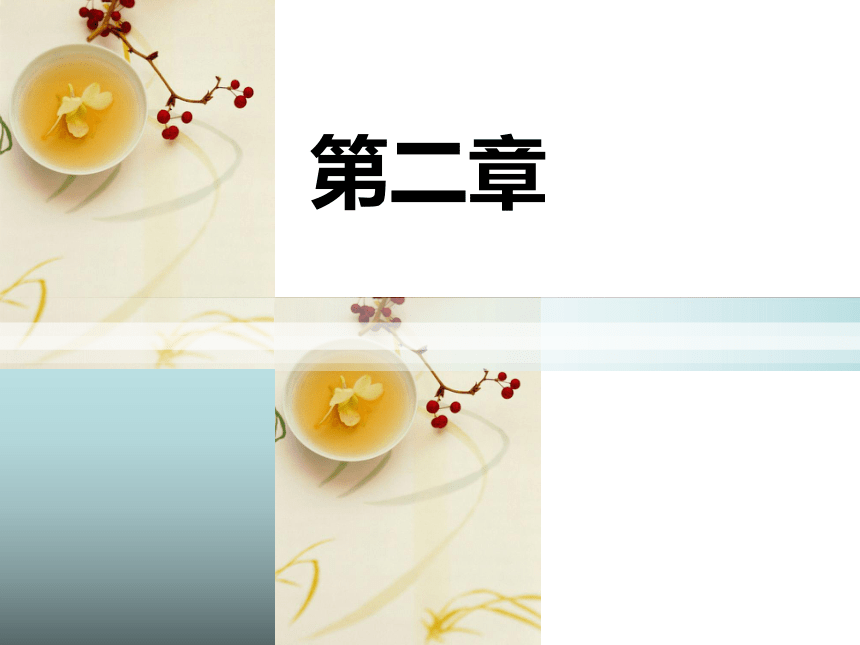 | |
| 格式 | zip | ||
| 文件大小 | 482.1KB | ||
| 资源类型 | 教案 | ||
| 版本资源 | 通用版 | ||
| 科目 | 英语 | ||
| 更新时间 | 2012-10-19 22:08:51 | ||
图片预览

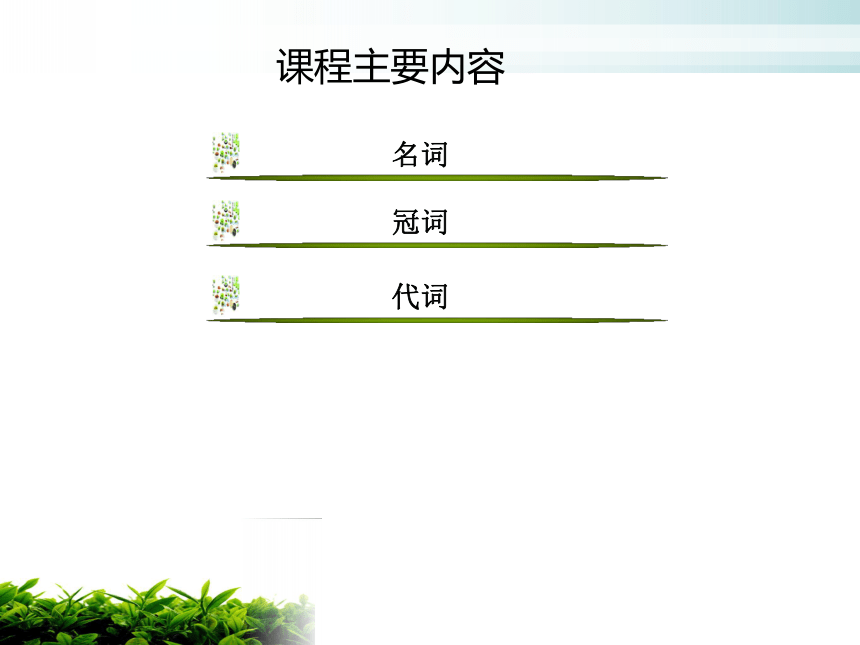
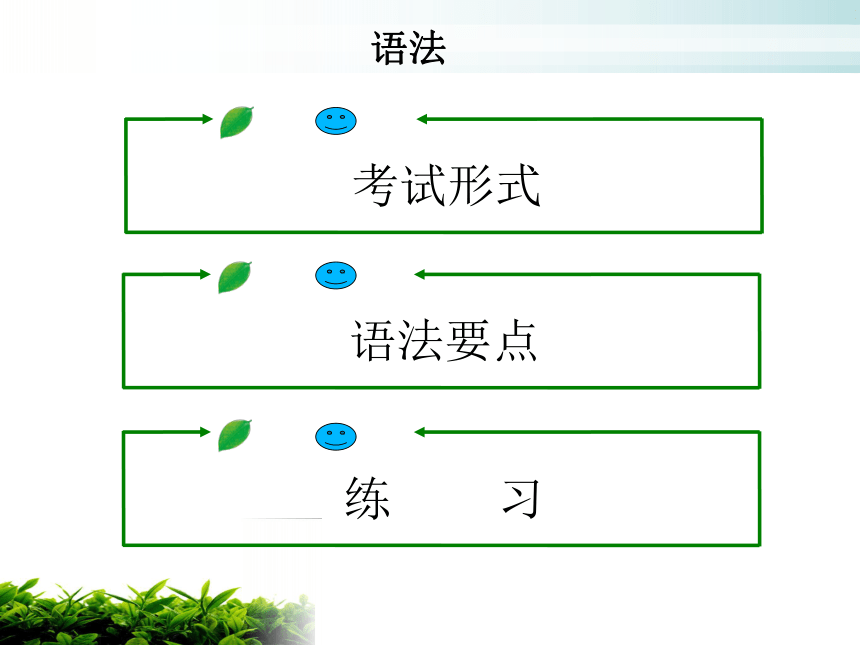
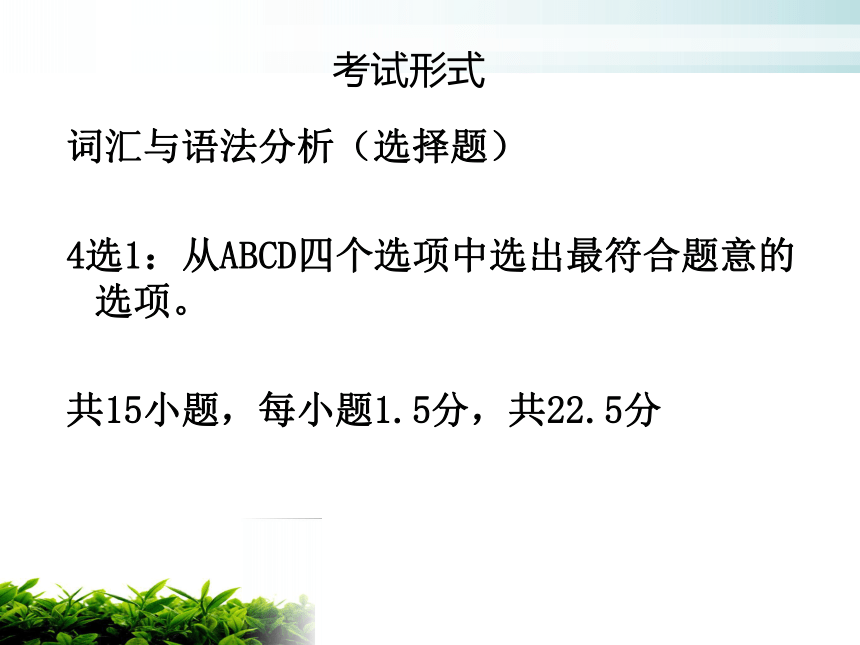
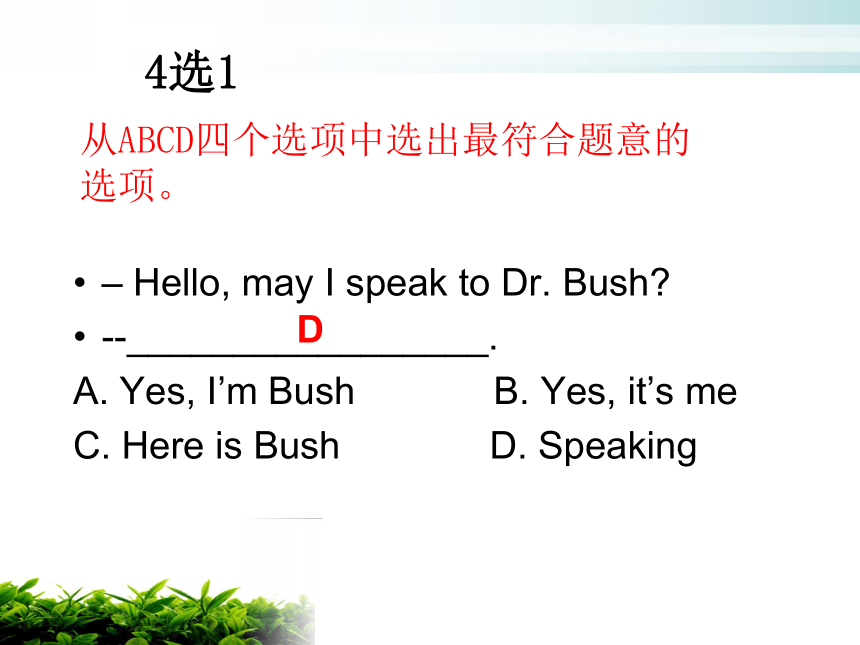
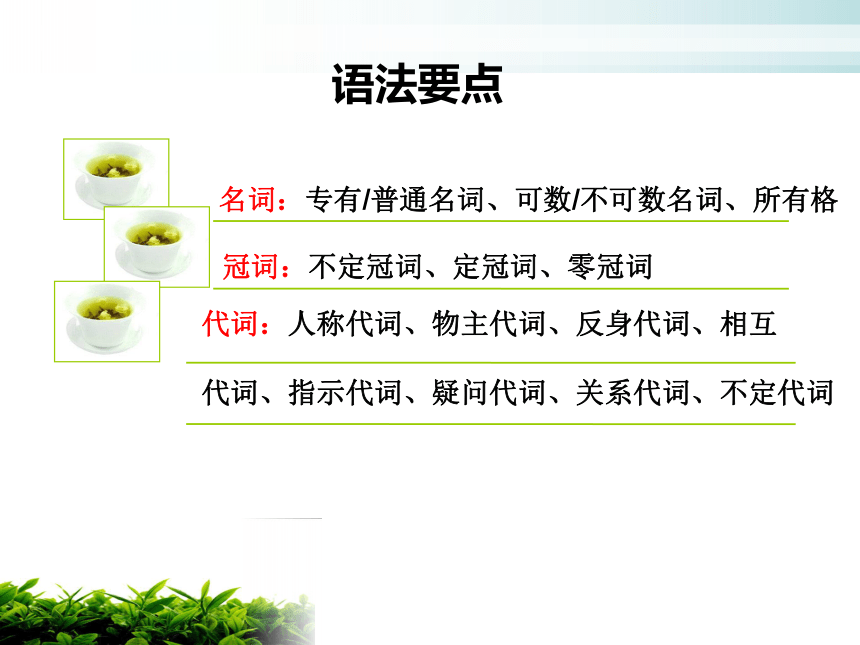
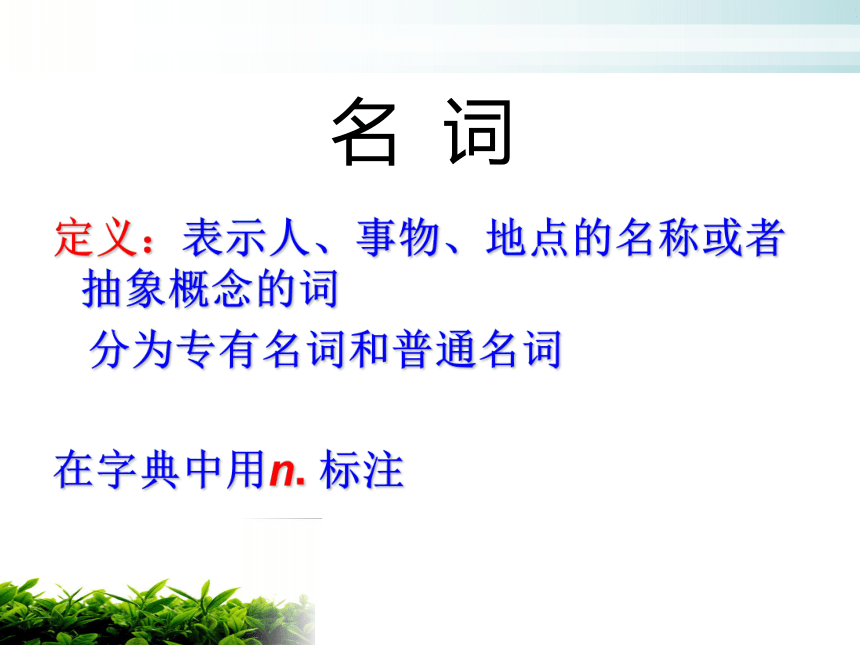
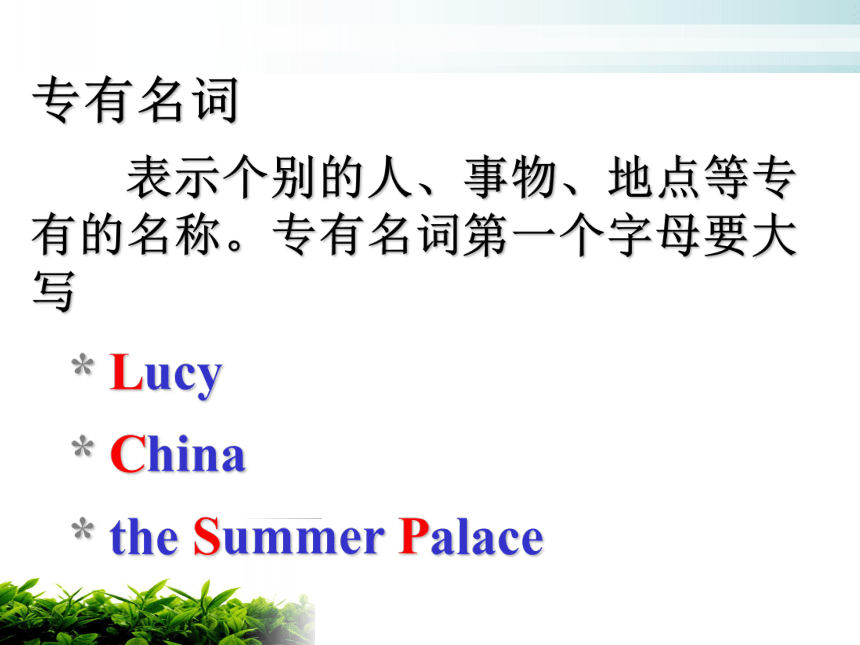

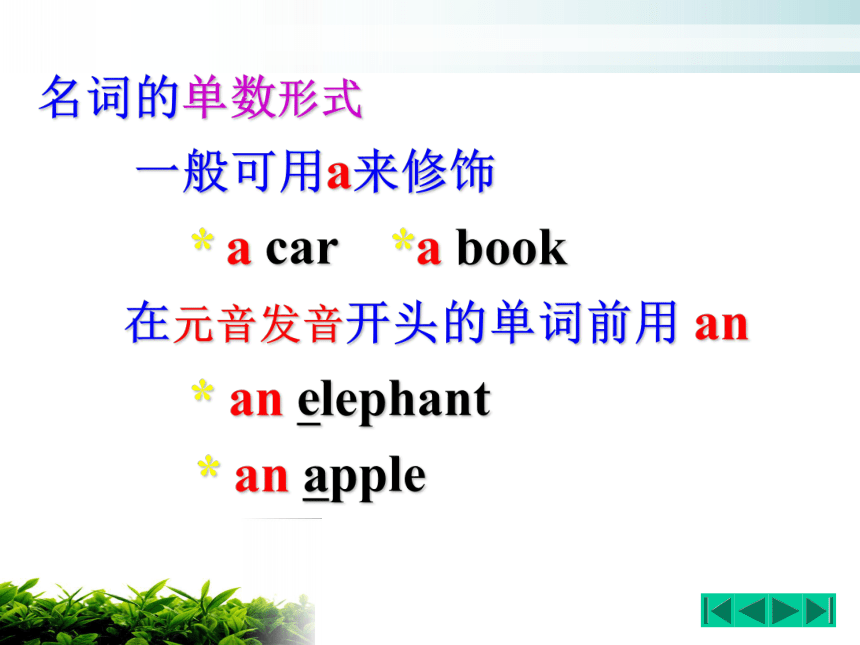
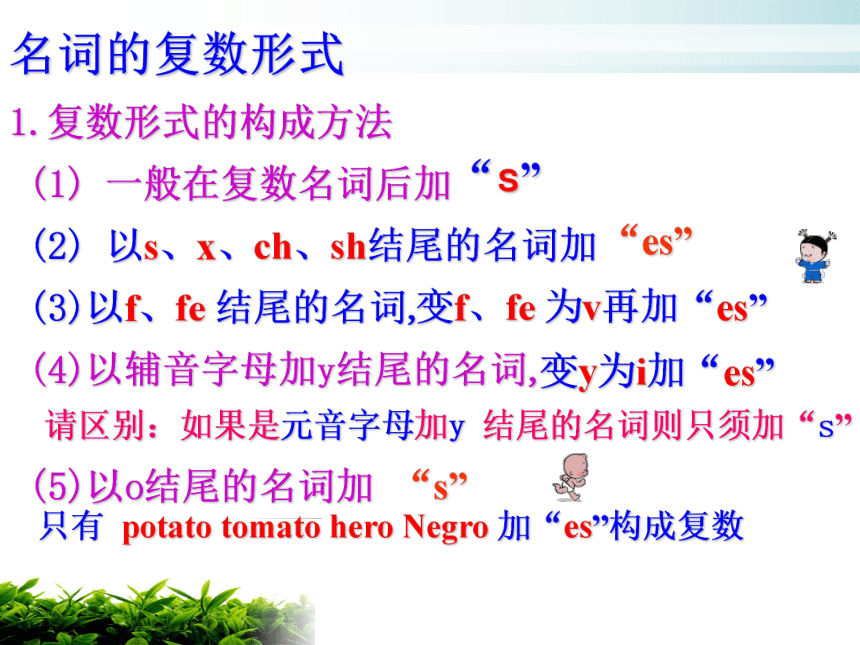
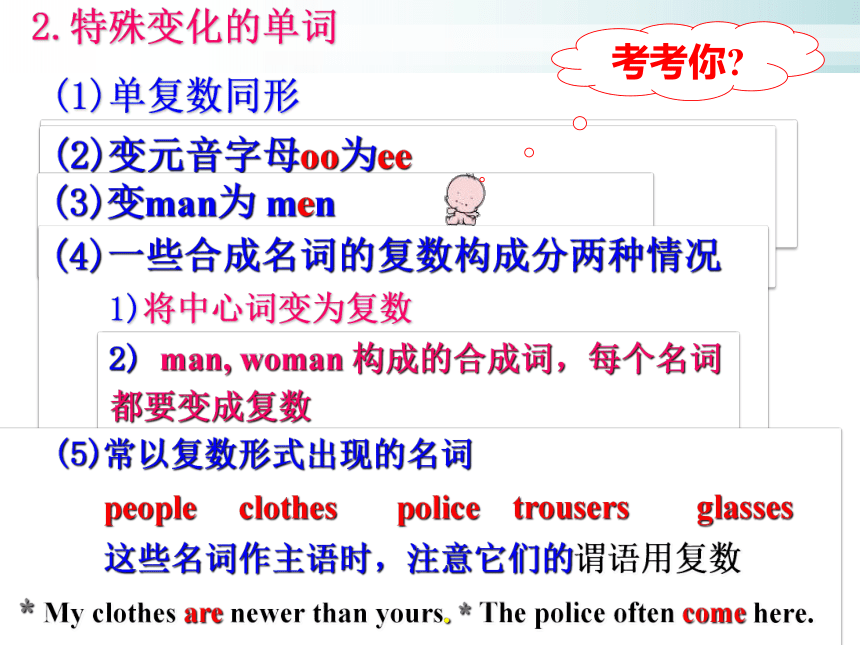
文档简介
(共60张PPT)
第二章
课程主要内容
名词
冠词
代词
语法
考试形式
语法要点
练 习
考试形式
词汇与语法分析(选择题)
4选1:从ABCD四个选项中选出最符合题意的 选项。
共15小题,每小题1.5分,共22.5分
4选1
– Hello, may I speak to Dr. Bush
--_________________.
A. Yes, I’m Bush B. Yes, it’s me
C. Here is Bush D. Speaking
从ABCD四个选项中选出最符合题意的 选项。
D
语法要点
名词:专有/普通名词、可数/不可数名词、所有格
冠词:不定冠词、定冠词、零冠词
代词:人称代词、物主代词、反身代词、相互
代词、指示代词、疑问代词、关系代词、不定代词
名 词
定义:表示人、事物、地点的名称或者抽象概念的词
分为专有名词和普通名词
在字典中用n. 标注
专有名词
表示个别的人、事物、地点等专有的名称。专有名词第一个字母要大写
* Lucy
* China
* the Summer Palace
普通名词
分为可数名词和不可数名词
★可数名词
表示人、事物、地点等的名称。
可数名词有单数和复数两种形式之分
名词的单数形式
一般可用a来修饰
* a car *a book
在元音发音开头的单词前用 an
* an elephant
* an apple
名词的复数形式
1.复数形式的构成方法
(1) 一般在复数名词后加
(2) 以s、x、ch、sh结尾的名词加
(3)以f、fe 结尾的名词,
(4)以辅音字母加y结尾的名词,
(5)以o结尾的名词加
“s”
“es”
变y为i加“es”
请区别:如果是元音字母加y 结尾的名词则只须加“s”
变f、fe 为v再加“es”
“s”
只有 potato tomato hero Negro 加“es”构成复数
2.特殊变化的单词
(1)单复数同形
Chinese – Chinese fish – fish
Japanese – Japanese sheep–sheep
(2)变元音字母oo为ee
tooth – foot –
teeth
feet
(3)变man为 men
man – men woman –
policeman –
Frenchman –
women
policemen
Frenchmen
German(德国人) –
Germans
(4)一些合成名词的复数构成分两种情况
1)将中心词变为复数
girlfriend –
grandchild –
girlfriends
grandchildren
2) man, woman 构成的合成词,每个名词
都要变成复数
a man doctor –
a woman teacher –
men doctors
women teachers
(5)常以复数形式出现的名词
people clothes police trousers glasses
这些名词作主语时,注意它们的谓语用复数
* My clothes are newer than yours. * The police often come here.
考考你
★不可数名词
不能用数目计算的事物和概念的名词
学科名词:physics, politics, maths
专有名词:the news, the United States, Chinese, Japanese
物质名词和抽象名词:rain, sunshine, oil, water, advice, information
特别记住housework
不可数名词无复数,作主语时常看成单数
不可数名词
不可数名词表示数量的多少时,必须与表示数量的名词连用,即“数词+表示数量的名词(可数名词)+of+ 不可数名词”。如:
a cup of tea 一杯茶
two glasses of milk 两杯牛奶
three pieces of bread 三片面包
four bowls of rice 四碗米饭
five pieces of chalk 五支粉笔
有些不可数名词变为复数形式后,意义有所不同
time-times 时代、次数 work-works 著作
air-airs 神气 sand-sands沙滩
arm-arms 武器 cloth-clothes衣服
wood-woods 森林 force-forces 军队
名词所有格 表示名词间的所有关系“ …的”
一.名词所有格的构成方法
1.单数名词后加
“ ’s”
*Tom ’ s book *my friend’ s uncle
2.以s结尾的复数名词,
则在s后加“ ’”即可
*Teachers ’ Day *two weeks ’ holiday
3.不以s结尾的复数名词的所有格,
仍按惯例加“ ’s”
* Children’ s Day * men’ s shoes
4.用of加名词,构成所属关系的短语,主要用于表示无生命名词的所有关系
the color of the wall
*a picture of the classroom
二.名词所有格的几个注意点
1.可用名词所有格表示地点, 地点名词习惯上省略
* my aunt’s ( home) (我姑姑家)
* go to the teachers’ ( office)
(去老师办公室)
2.有些名词的所有格可用两种形式
*the cat’s name / the name of the cat
*China’s capital/
the capital of China
3.表示两人共同拥有,在最后一个名词后加“ ’s”
请区别: Lucy and Lily’s room
Lucy’s and Lily’s rooms
露西和莉莉的房间(两人
共有一间房)
露西的房间和莉莉的房间(两人各有一间房间)
4.主谓一致
主语单数后接介,谓语单数介无关,many a作主语也如此,谓语动词应用单。
代词neither,either,each等,用作主语谓全单。
and连接两名词,身兼两职一定冠,no,each,every后单名,两件(种)事(物)系一概念,以上情况请记清,谓语动词全用单。
不定式短语、动名词,主语从句谓全单。
时间、货币与距离,谓语多单复少见。
有些名词谓常复,people, police即这般。
形容词带the一类人,姓氏复数加定冠,-s结尾的海峡、山脉与群岛,谓语用复勿用单。
集体名词谓用单,如若强调其成员,复数谓语记心间。
代词all指人谓复数,all指事情谓用单。
rest,means,fol1owing等,意义决定其复、单。
or、nor、but also、there be,近主原则挂嘴 边。
关系代词定主语,谓语根据先行词判。
none,all,half of等,of之宾语定答案。
还有分数、百分数,仍据of之宾定复、单。
量词用法请注意,谓语要随量词变。
16. Studies will be needed to see if the medicine has any on the disease.(2011)
A. wealth B. effect C. price D. market
10. His _____ is so great that money doesn’t mean much to him. (2010)
A. idea B. richness C. health D. wealth
B
D
解析:这药是否可以有效医治这种病的研究是需要的。
have an/any effect on 对…产生效果
解析:从后半句“money don’t mean much to him”可知,他很富有。Wealth是指财富;richness是指丰富,丰富性。
6. Take my ____, young man, and don’t drive so fast. (2007)
A. notice B. expression C. advice D. experience
12. Helen made ____to visit her parents once a month, but she didn’t keep it.(2005)
A. an offer B. a decision C. an effort D. a promise
C
D
解析:采纳我的意见/建议。notice指通知;expression指表达;experience指经验。
解析:Helen承诺每个月看望父母一次,但没坚守诺言。make an offer 出价; make a decision 做决定;make an effort 努力。
14. Neither my wife nor I ______ able to persuade our daughter to change her mind.(2005)
A. am B. are C. have been D. is
12.We went to see the play last night and got a lot of _____ from it.(2004)
A. content B. interest C. spirit D. fun
A
D
解析:保持主谓一致,neither…nor句型中,遵循就近原则。 I am…
解析:我们昨晚去看了一场表演,收获了很多乐趣。content 内容;interest 兴趣;spirit 精神。
17. Something about his manager suggested that he _____ not interested in what we were doing.(2002)
A. was B. were C. be D. is
24. These three English novels are for you. The rest _______ for the other students in your class.(2003)
A. were B. is C. are D. was
A
C
解析:主语是he,谓语用第三人称单数;整个句子是过去时态,所以用was。考查了两个知识点。
解析:前面有提到novels,后面the rest(novels)以防累赘,novels省略。所以该用复数的,前面也是用are,所以不是过去时。
冠 词Article
虚词,本身无独立的意义, 它用来帮助说明名词所指的人或物是泛指还是特指
不定冠词a, an
定冠词 the
(泛指)
(特指)
1.不定冠词 a/an的用法
1)表示某人(事物)的某一种类
* My father is a driver.
* Do you like an apple or a pear
2) 表示某一事物中的任何一个
*An elephant is bigger than a horse.
*A monkey can climb trees.
3)表示某人某物,但不具体说明何人何物。
*A student from Class Two runs fastest.
*A man is calling now.
4)表示数量, 有“一” 的含义
*There is a flower in the vase.
*A panda has a mouth , a nose,two eyes.
5)有些不可数名词要表示“一种”、“一场”、
“一堆”时, 须加不定冠词
*a heavy snow *a strong wind
*make a fire *have a good time
6.用在抽象名词前,表示“一阵,
一份,一类,一场”等。
This little girl is a joy to her parents.
a pleasure , a surprise ,
an exciting experience , a success,
His new book is a great success.
It is a pleasure to work with you.
抽象名词:表示状态,品质,行为,感情等抽
象概念的词。
不定冠词的用法
7.用于某些固定词组中
1. have a swim / walk/ look / talk,
have a cold; have a good time ; keep a diary ;
in a hurry ; for a while ; once upon a time
2. What a / such a / quite a / rather a / + 单数可数名词
too / as / so / how/however + adj + a + 单数可数名词
many a +单数可数名词
2.定冠词 the 的用法
1)指上文提到过的人或物,用定冠词the
2)世界上独一无二的事物前用定冠词the
*the sun *the moon *the earth
3)定冠词the用于序数词前或表示方位的名词前和形容词最高级前
*the first *the best *in the south
4)乐器名称前用定冠词the
* play the piano * play the violin
5)在复数姓氏前加the,表示××一家人,常看成复数
1*The Browns are going to Shanghai for a holiday this summer.
The Brown family
6)在一些形容词前,表示一类人
*the rich 富人 *the old 老人
7)在一些专有名词和习惯用语中常用定冠词the
the Great Wall *by the way*in the morning
定冠词的用法
独一无二最高级,江河湖海和乐器,
阶级党团和报纸,还有组织和杂志,
说过的人或事,同一东西大家知悉,
姓氏前指一家人,序数词前表第几。
3.零冠词
1)在节日、星期、月份、季节、年、学科等词前
不用冠词
*in summer *in August
*on Sunday *study physics
请区别:in the spring of 1945
(特指,加the )
2)一日三餐和球类运动名词前不用冠词
*have breakfast *play football
3)名词前已有this, that, my, your, some, any,each作定语,不用冠词
* They met here this morning.
* Each boy has a workbook.
4)一些专有名词、不可数名词、称呼、头衔
不用冠词
China meat Grade Two
Mr.Li Dr.Liu
5)表示颜色、语种、国家前不用冠词
* in red * Japanese *(spoken) English
6)固定词组
* go to bed * by bus * at night * in time
季节、月份和星期,节日、三餐和 语言,
学科、称呼语和头衔,职位和球棋
零冠词的用法
4.在有些词组中,有冠词和无冠词意思不同
★ in front of
in the front of
*There is a tree in front of the house.
房子前面有一棵树
* The teachers’ desk is in the front of the classroom.
讲台在教室的前部
在…前面
在…范围内的正前部
★ in hospital
in the hospital
*He’s ill in hospital.
他生病住院。
*My parents work in the hospital.
我的父母在医院工作。
(生病)住院
在医院里
4.有定冠词与无定冠词的区别
sit at table 吃饭
sit at the table 在桌子旁
be in charge of …负责…
be in the charge of 由…负责
by day 在白天
by the day 按日
take place 发生
take the place of 代替
in possession of 拥有持有
in the possession of 某人所占有
in place of 代替
in the place of 在…的地方
for a moment 一会儿
for the moment 暂时
on earth 在世上, 究竟
on the earth 在地球上
a number of 许多
the number of 的数字/量
in hospital 住院
in the hospital 在医院
6. My birthday is on Friday this year.(2011)
A. 不填 B. a C. an D. the
7. They have three reasons for keeping their marriage ______ secret for _____ moment.(2005)
A. a; 不填 B. the; a C. 不填; the D. a; the
B
解析:我的生日在今年的某一个星期五。(非特指)
D
解析: keep sth. a secret 保密
for the moment 此刻,目前
22. To reduce weight,plastic has taken _______ of iron and steel in making boats.(2003)
A. its place B. place C. the place D. a place
21. Her dog ran out of the yard _____ the old lady opened the gate.(2002)
A. moment B. a moment C. the moment D. that moment
C
C
解析:the moment 一…就…; moment 重要时刻;
a moment 片刻; that moment 一瞬间
解析:take the place of 代替…; take sb. to a place带某人到某地 ; take place 发生
代词
定义&分类:
代替名词的一种词类。大多数代词具有名词和形容词的功能。英语中的代词。
按其意义、特征及在句中的作用分为:人称代词、物主代词、指示代词、反身代词、相互代词、疑问代词、关系代词和不定代词八种。
一、人称代词
we , I , you , they, us, me, etc.
二、物主代词
our, my ,your, their, his, her, etc.
三、反身代词
ourselves, myself, yourself , herself
四、相互代词
each other ,one another , etc.
五、指示代词
this , that , these , those , such , etc.
六、疑问代词
what, when, who, where, whose, etc.
七、关系代词
that, when, who, where, whose , etc.
八、不定代词
any , some ,every , many , much , a little
一、人称代词的用法
1)人称代词的主格在句子中作主语或主语补语,
例如: John waited a while but eventually he went home. 约翰等了一会儿,最后他回家了。 John hoped the passenger would be Mary and
indeed it was she. 约翰希望那位乘客是玛丽,还真是她。
在复合句中,如果主句和从句主语相同,
代词主语要用在从句中,名词主语用在主句中, When he arrived, John went straight to the bank. 约翰一到就直接去银行了。
注意:
2)人称代词的宾格在句子中作宾语或介词宾语,
但在口语中也能作主语补语,第一人称在省略
句中,还可以作主语,
例如: I saw her with them, at least, I thought it was her. 我看到她和他们在一起,至少我认为是她。
(her做宾 语,them做介词宾语,her做主语补语) a. -- Who broke the vase --谁打碎了花瓶? b. -- Me. --我。(me做主语补语= It‘s me.) c. ---- I like English. ---- Me too. d.---- Have more wine ---- Not me.
--再来点酒喝吗 --我可不要了。
二、物主代词的用法
物主代词有形容词性(my, your,his,her等)
和名词性(mine, yours,ours,hers等)两种,
形容词性的物主代词属于限定词,作定语。 名词性的物主代词在用法上相当于省略了
中心名词的-‘s属格结构,作主语,宾语,表语。
例如: Jack’s cap 意为 The cap is Jack’s. His cap 意为 The cap is his. May I use your pen Yours (=your pen)
works better.
● I love my motherland as much as you
love yours. 我爱我的祖国就像你爱你的祖国一样深。 ● Your should interpret what I said in my
sense of the word, not in yours. 你应当按我所用的词义去解释我说的
话,而不能按你自己的意义去解释。 ● The life I have is yours.
我的生命属于你。
三、反身代词的用法
反身代词在句中可作宾语,表语,同位语 We enjoyed ourselves very much last night.
我们昨晚玩得很开心。 Please help yourself to some fish.
请你随便吃点鱼。
I am not myself today.
我今天不舒服。 The thing itself is not important.
事情本身并不重要。
四、相互代词的用法
相互代词只有each other和one another两个
词组在句中作动词或介词宾语
如:
It is easy to see that the people of different
cultures have always copied each other. 显而易见,不同文化的人总是相互借鉴的。
He put all the books beside one another. 他把所有书并列摆放起来。 注意:相互代词可加-‘s构成所有格,例如: The students borrowed each other's notes. 学生们互借笔记。
五、指示代词的用法
指示代词分单数(this / that)和复数(these /
those)两种形式,既可作限定词又可做代词
作主语,宾语,表语和定语.
如:
This is the way to do it. 这事儿就该这样做。
I like this better than that. 我喜欢这个甚过那个。
My point is this.我的观点就是如此。 I don‘t say no to that. 我并未拒绝那个。
That和those可作定语从句的先行词,但this和 these不能,同时,在作先行词时,只有those
可指人,试比较: (对) He admired that which looked beautiful.
他赞赏外表漂亮的东西。 (对) He admired those who looked beautiful. 他
赞赏那些外表漂亮的人。(those指人) (错) He admired that who danced well.
(that作宾语时不能指人) (对) He admired those which looked beautiful.
他赞赏那些外表漂亮的东西。(those指物)
every , no, all, both, neither, nor的用法
every和no在句中只能作定语。 I have no idea about it.
b. all 都,指三者以上。
all 的主谓一致:all的单复数由它所修饰或指代的名词的单复数决定。 All goes well. 一切进展得很好。
all 通常不与可数名词单数连用,
如:不说 all the book(错),而说 the whole book。
但all可与表时间的可数名词单数连用,
如 all day,all night,all the year;
但习惯上不说 all hour,all century(错)。
all还可以与一些特殊的单数名词连用,
如 all China, all the city, all my life, all the way
五、不定代词的用法
c. both 都,指两者。 both 与复数动词连用,但 both… and…可与单数名词连用。 I don’t like both books.
He can speak both English and French.
d. neither 两者都不 neither作主语时,谓语动词用单数。作定语与单数名词连用,但 neither… nor 用作并列连词,可与复数名词连用。其谓语采用就近原则。 Neither is what I want to have.
Neither the food nor the clothes sold in this supermarket are expensive.
none, few, some, any, 的用法
none 无 1) none作主语,多与of 构成短语 none of。 在答语中,none可单独使用。 Are there any pictures on the wall None. 2) none作主语,谓语动词单复数均可。但如做表语,则其单复数与表语一致。 It is none of your business.
few 一些,少数 few 作主语时,谓语动词用复数,多用于肯定句。 Few of my friends are there.
----Are there many
----There are few.
c. some 一些 1) 可与复数名词及不可数名词连用。 2) 当做“某一”解时,也可与单数名词连用
( = a certain)You will be sorry for this some day. 总有一天,你会后悔这件事的。 A certain (some) person has seen you break the rule. 有人看见你违规。
注意: (1)在肯定疑问句中用some代替any。说话人认为对方的答案会是肯定的,或期望得到肯定回答
Would you like some coffee
(2)当否定的是整体中的部分时,some可用于否定句。如: I haven‘t heard from some of my old friends these years. 这些年我没有收到一些老朋友的信。
d. any 一些 any 多用于否定句和疑问句和条件状语从句中。 当句中含有任何的意思时,any可用于肯定句。 如:
Here are three novels. You may read any.
这有三本小说,你可任读一本。
one,that 和it比较辩异
one表示泛指,that和it 表示特指。that与所指名词为同类,但不是同一个,而it 与所指名词为同一个。 I can‘t find my hat. I think I must buy one.
(不定)
我找不到我的帽子了。我想我该去买一顶。 The hat you bought is bigger than that I bought. (同类但不同个) 你买的那顶帽子比我买的大。 I can't find my hat. I don' t know where I put it. ( 同一物) 我找不到我的帽子。我不知道我把它放在哪了。
one/another/the other比较辩异
只有两个
one… the other
有三个以上
some… the others one… another,another… some… others,others… others = other people/things the others = the rest 剩余的全部
one the other
…
one another
one the others
…
some others
…
some the others
找不同
few, little, a few, a little比较辩异
a.few + 可数名词, (a) little + 不可数名词 a few / a little 为肯定含义,还有一点 few / little 为否定含义,没有多少了。 He has a few friends. 他有几个朋友。 He has few friends. 他几乎没有朋友。 We still have a little time. 我们还有点时间。 There is little time left.几乎没剩下什么时间了。
b.固定搭配: only a few (=few) not a few (=many)
quite a few (=many) not a little (=very much)
7. – Have you got a camera
-- No, I should buy ______ .(2010)
A. it B. one C. that D. this
7. Over a hundred people expressed their worries,
but were willing to help.(2009)
A. some B. many C. few D. little
B
C
解析:it 代表就是这件东西; one 同一类中的一个,泛指;
that 那个;this这个
解析:一百多人表达出担忧,但是几乎没人愿意帮忙。
根据题意可知是否定,排除A、B,Few修饰可数名词,表示几乎没有,因为but转折连词,因此后半句是否定的意思。
30. My friends and I would like to go to the concert,but ________ of us has got a ticket.(2003) A. both B. none C. neither D. all
12. There are five language labs in this building. One is on the second floor and____ on the third floor.(2008)
other B the other
C other four D the others\
D
one the others
解析:neither是指两者都不;none指三者或三者以上;
My friends and I 是指三个以上的人。
B
19. Jackie could sing and play the piano, while I could do ______.(2007)
A. any B. both C. either D. neither
11.The two players had been warned of the danger, but _____ of them seemed to take it seriously.(2004)
A. both B. neither C. any D. either
D
B
解析:首先从句意来看,前者会唱会弹,而后者两者都不会。
any适用于三者及以上,both用于两者,但依据句意不选,either表示两者中一者,若选他依据句意少否定词,故舍。D表两者都不,符合句意。
解析:句子中间有转折连词but,说明后半句与前半句的意思有转折作用。根据意境,填neither,表示“两个人都不。。。”。其它三个选项都不能表达这个意思。
7. I asked two people to help me start my car, but ____ of them knew what to do.(2002)
A. either B. none C. both D. neither
22. –The phone is ringing.
-- Who could _____ be It is already midnight.(2002)
A. he B. it C. this D. that
D
B
解析:neither,表示“两个人都不…”。either是指“两者选一”,both是指“两者都…”,none指三者或三者以上都不…
解析:B表猜测,不知道电话那头是男是女,用it来代替。
17.For a long time after the operation, Linda found _____ difficult to fall asleep.(2004)
A. this B. one C. that D. it
14. After working for two hours, I found impossible to complete the paper in time.(2009)
A. me B. this C. that D. it
解析:it 形式宾语,指代to fall asleep find it +形容词 + to do
解析:it 做形式宾语,真正的宾语是to complete the paper in time。 that 不可以做形式宾语。
D
D
Thank you!
第二章
课程主要内容
名词
冠词
代词
语法
考试形式
语法要点
练 习
考试形式
词汇与语法分析(选择题)
4选1:从ABCD四个选项中选出最符合题意的 选项。
共15小题,每小题1.5分,共22.5分
4选1
– Hello, may I speak to Dr. Bush
--_________________.
A. Yes, I’m Bush B. Yes, it’s me
C. Here is Bush D. Speaking
从ABCD四个选项中选出最符合题意的 选项。
D
语法要点
名词:专有/普通名词、可数/不可数名词、所有格
冠词:不定冠词、定冠词、零冠词
代词:人称代词、物主代词、反身代词、相互
代词、指示代词、疑问代词、关系代词、不定代词
名 词
定义:表示人、事物、地点的名称或者抽象概念的词
分为专有名词和普通名词
在字典中用n. 标注
专有名词
表示个别的人、事物、地点等专有的名称。专有名词第一个字母要大写
* Lucy
* China
* the Summer Palace
普通名词
分为可数名词和不可数名词
★可数名词
表示人、事物、地点等的名称。
可数名词有单数和复数两种形式之分
名词的单数形式
一般可用a来修饰
* a car *a book
在元音发音开头的单词前用 an
* an elephant
* an apple
名词的复数形式
1.复数形式的构成方法
(1) 一般在复数名词后加
(2) 以s、x、ch、sh结尾的名词加
(3)以f、fe 结尾的名词,
(4)以辅音字母加y结尾的名词,
(5)以o结尾的名词加
“s”
“es”
变y为i加“es”
请区别:如果是元音字母加y 结尾的名词则只须加“s”
变f、fe 为v再加“es”
“s”
只有 potato tomato hero Negro 加“es”构成复数
2.特殊变化的单词
(1)单复数同形
Chinese – Chinese fish – fish
Japanese – Japanese sheep–sheep
(2)变元音字母oo为ee
tooth – foot –
teeth
feet
(3)变man为 men
man – men woman –
policeman –
Frenchman –
women
policemen
Frenchmen
German(德国人) –
Germans
(4)一些合成名词的复数构成分两种情况
1)将中心词变为复数
girlfriend –
grandchild –
girlfriends
grandchildren
2) man, woman 构成的合成词,每个名词
都要变成复数
a man doctor –
a woman teacher –
men doctors
women teachers
(5)常以复数形式出现的名词
people clothes police trousers glasses
这些名词作主语时,注意它们的谓语用复数
* My clothes are newer than yours. * The police often come here.
考考你
★不可数名词
不能用数目计算的事物和概念的名词
学科名词:physics, politics, maths
专有名词:the news, the United States, Chinese, Japanese
物质名词和抽象名词:rain, sunshine, oil, water, advice, information
特别记住housework
不可数名词无复数,作主语时常看成单数
不可数名词
不可数名词表示数量的多少时,必须与表示数量的名词连用,即“数词+表示数量的名词(可数名词)+of+ 不可数名词”。如:
a cup of tea 一杯茶
two glasses of milk 两杯牛奶
three pieces of bread 三片面包
four bowls of rice 四碗米饭
five pieces of chalk 五支粉笔
有些不可数名词变为复数形式后,意义有所不同
time-times 时代、次数 work-works 著作
air-airs 神气 sand-sands沙滩
arm-arms 武器 cloth-clothes衣服
wood-woods 森林 force-forces 军队
名词所有格 表示名词间的所有关系“ …的”
一.名词所有格的构成方法
1.单数名词后加
“ ’s”
*Tom ’ s book *my friend’ s uncle
2.以s结尾的复数名词,
则在s后加“ ’”即可
*Teachers ’ Day *two weeks ’ holiday
3.不以s结尾的复数名词的所有格,
仍按惯例加“ ’s”
* Children’ s Day * men’ s shoes
4.用of加名词,构成所属关系的短语,主要用于表示无生命名词的所有关系
the color of the wall
*a picture of the classroom
二.名词所有格的几个注意点
1.可用名词所有格表示地点, 地点名词习惯上省略
* my aunt’s ( home) (我姑姑家)
* go to the teachers’ ( office)
(去老师办公室)
2.有些名词的所有格可用两种形式
*the cat’s name / the name of the cat
*China’s capital/
the capital of China
3.表示两人共同拥有,在最后一个名词后加“ ’s”
请区别: Lucy and Lily’s room
Lucy’s and Lily’s rooms
露西和莉莉的房间(两人
共有一间房)
露西的房间和莉莉的房间(两人各有一间房间)
4.主谓一致
主语单数后接介,谓语单数介无关,many a作主语也如此,谓语动词应用单。
代词neither,either,each等,用作主语谓全单。
and连接两名词,身兼两职一定冠,no,each,every后单名,两件(种)事(物)系一概念,以上情况请记清,谓语动词全用单。
不定式短语、动名词,主语从句谓全单。
时间、货币与距离,谓语多单复少见。
有些名词谓常复,people, police即这般。
形容词带the一类人,姓氏复数加定冠,-s结尾的海峡、山脉与群岛,谓语用复勿用单。
集体名词谓用单,如若强调其成员,复数谓语记心间。
代词all指人谓复数,all指事情谓用单。
rest,means,fol1owing等,意义决定其复、单。
or、nor、but also、there be,近主原则挂嘴 边。
关系代词定主语,谓语根据先行词判。
none,all,half of等,of之宾语定答案。
还有分数、百分数,仍据of之宾定复、单。
量词用法请注意,谓语要随量词变。
16. Studies will be needed to see if the medicine has any on the disease.(2011)
A. wealth B. effect C. price D. market
10. His _____ is so great that money doesn’t mean much to him. (2010)
A. idea B. richness C. health D. wealth
B
D
解析:这药是否可以有效医治这种病的研究是需要的。
have an/any effect on 对…产生效果
解析:从后半句“money don’t mean much to him”可知,他很富有。Wealth是指财富;richness是指丰富,丰富性。
6. Take my ____, young man, and don’t drive so fast. (2007)
A. notice B. expression C. advice D. experience
12. Helen made ____to visit her parents once a month, but she didn’t keep it.(2005)
A. an offer B. a decision C. an effort D. a promise
C
D
解析:采纳我的意见/建议。notice指通知;expression指表达;experience指经验。
解析:Helen承诺每个月看望父母一次,但没坚守诺言。make an offer 出价; make a decision 做决定;make an effort 努力。
14. Neither my wife nor I ______ able to persuade our daughter to change her mind.(2005)
A. am B. are C. have been D. is
12.We went to see the play last night and got a lot of _____ from it.(2004)
A. content B. interest C. spirit D. fun
A
D
解析:保持主谓一致,neither…nor句型中,遵循就近原则。 I am…
解析:我们昨晚去看了一场表演,收获了很多乐趣。content 内容;interest 兴趣;spirit 精神。
17. Something about his manager suggested that he _____ not interested in what we were doing.(2002)
A. was B. were C. be D. is
24. These three English novels are for you. The rest _______ for the other students in your class.(2003)
A. were B. is C. are D. was
A
C
解析:主语是he,谓语用第三人称单数;整个句子是过去时态,所以用was。考查了两个知识点。
解析:前面有提到novels,后面the rest(novels)以防累赘,novels省略。所以该用复数的,前面也是用are,所以不是过去时。
冠 词Article
虚词,本身无独立的意义, 它用来帮助说明名词所指的人或物是泛指还是特指
不定冠词a, an
定冠词 the
(泛指)
(特指)
1.不定冠词 a/an的用法
1)表示某人(事物)的某一种类
* My father is a driver.
* Do you like an apple or a pear
2) 表示某一事物中的任何一个
*An elephant is bigger than a horse.
*A monkey can climb trees.
3)表示某人某物,但不具体说明何人何物。
*A student from Class Two runs fastest.
*A man is calling now.
4)表示数量, 有“一” 的含义
*There is a flower in the vase.
*A panda has a mouth , a nose,two eyes.
5)有些不可数名词要表示“一种”、“一场”、
“一堆”时, 须加不定冠词
*a heavy snow *a strong wind
*make a fire *have a good time
6.用在抽象名词前,表示“一阵,
一份,一类,一场”等。
This little girl is a joy to her parents.
a pleasure , a surprise ,
an exciting experience , a success,
His new book is a great success.
It is a pleasure to work with you.
抽象名词:表示状态,品质,行为,感情等抽
象概念的词。
不定冠词的用法
7.用于某些固定词组中
1. have a swim / walk/ look / talk,
have a cold; have a good time ; keep a diary ;
in a hurry ; for a while ; once upon a time
2. What a / such a / quite a / rather a / + 单数可数名词
too / as / so / how/however + adj + a + 单数可数名词
many a +单数可数名词
2.定冠词 the 的用法
1)指上文提到过的人或物,用定冠词the
2)世界上独一无二的事物前用定冠词the
*the sun *the moon *the earth
3)定冠词the用于序数词前或表示方位的名词前和形容词最高级前
*the first *the best *in the south
4)乐器名称前用定冠词the
* play the piano * play the violin
5)在复数姓氏前加the,表示××一家人,常看成复数
1*The Browns are going to Shanghai for a holiday this summer.
The Brown family
6)在一些形容词前,表示一类人
*the rich 富人 *the old 老人
7)在一些专有名词和习惯用语中常用定冠词the
the Great Wall *by the way*in the morning
定冠词的用法
独一无二最高级,江河湖海和乐器,
阶级党团和报纸,还有组织和杂志,
说过的人或事,同一东西大家知悉,
姓氏前指一家人,序数词前表第几。
3.零冠词
1)在节日、星期、月份、季节、年、学科等词前
不用冠词
*in summer *in August
*on Sunday *study physics
请区别:in the spring of 1945
(特指,加the )
2)一日三餐和球类运动名词前不用冠词
*have breakfast *play football
3)名词前已有this, that, my, your, some, any,each作定语,不用冠词
* They met here this morning.
* Each boy has a workbook.
4)一些专有名词、不可数名词、称呼、头衔
不用冠词
China meat Grade Two
Mr.Li Dr.Liu
5)表示颜色、语种、国家前不用冠词
* in red * Japanese *(spoken) English
6)固定词组
* go to bed * by bus * at night * in time
季节、月份和星期,节日、三餐和 语言,
学科、称呼语和头衔,职位和球棋
零冠词的用法
4.在有些词组中,有冠词和无冠词意思不同
★ in front of
in the front of
*There is a tree in front of the house.
房子前面有一棵树
* The teachers’ desk is in the front of the classroom.
讲台在教室的前部
在…前面
在…范围内的正前部
★ in hospital
in the hospital
*He’s ill in hospital.
他生病住院。
*My parents work in the hospital.
我的父母在医院工作。
(生病)住院
在医院里
4.有定冠词与无定冠词的区别
sit at table 吃饭
sit at the table 在桌子旁
be in charge of …负责…
be in the charge of 由…负责
by day 在白天
by the day 按日
take place 发生
take the place of 代替
in possession of 拥有持有
in the possession of 某人所占有
in place of 代替
in the place of 在…的地方
for a moment 一会儿
for the moment 暂时
on earth 在世上, 究竟
on the earth 在地球上
a number of 许多
the number of 的数字/量
in hospital 住院
in the hospital 在医院
6. My birthday is on Friday this year.(2011)
A. 不填 B. a C. an D. the
7. They have three reasons for keeping their marriage ______ secret for _____ moment.(2005)
A. a; 不填 B. the; a C. 不填; the D. a; the
B
解析:我的生日在今年的某一个星期五。(非特指)
D
解析: keep sth. a secret 保密
for the moment 此刻,目前
22. To reduce weight,plastic has taken _______ of iron and steel in making boats.(2003)
A. its place B. place C. the place D. a place
21. Her dog ran out of the yard _____ the old lady opened the gate.(2002)
A. moment B. a moment C. the moment D. that moment
C
C
解析:the moment 一…就…; moment 重要时刻;
a moment 片刻; that moment 一瞬间
解析:take the place of 代替…; take sb. to a place带某人到某地 ; take place 发生
代词
定义&分类:
代替名词的一种词类。大多数代词具有名词和形容词的功能。英语中的代词。
按其意义、特征及在句中的作用分为:人称代词、物主代词、指示代词、反身代词、相互代词、疑问代词、关系代词和不定代词八种。
一、人称代词
we , I , you , they, us, me, etc.
二、物主代词
our, my ,your, their, his, her, etc.
三、反身代词
ourselves, myself, yourself , herself
四、相互代词
each other ,one another , etc.
五、指示代词
this , that , these , those , such , etc.
六、疑问代词
what, when, who, where, whose, etc.
七、关系代词
that, when, who, where, whose , etc.
八、不定代词
any , some ,every , many , much , a little
一、人称代词的用法
1)人称代词的主格在句子中作主语或主语补语,
例如: John waited a while but eventually he went home. 约翰等了一会儿,最后他回家了。 John hoped the passenger would be Mary and
indeed it was she. 约翰希望那位乘客是玛丽,还真是她。
在复合句中,如果主句和从句主语相同,
代词主语要用在从句中,名词主语用在主句中, When he arrived, John went straight to the bank. 约翰一到就直接去银行了。
注意:
2)人称代词的宾格在句子中作宾语或介词宾语,
但在口语中也能作主语补语,第一人称在省略
句中,还可以作主语,
例如: I saw her with them, at least, I thought it was her. 我看到她和他们在一起,至少我认为是她。
(her做宾 语,them做介词宾语,her做主语补语) a. -- Who broke the vase --谁打碎了花瓶? b. -- Me. --我。(me做主语补语= It‘s me.) c. ---- I like English. ---- Me too. d.---- Have more wine ---- Not me.
--再来点酒喝吗 --我可不要了。
二、物主代词的用法
物主代词有形容词性(my, your,his,her等)
和名词性(mine, yours,ours,hers等)两种,
形容词性的物主代词属于限定词,作定语。 名词性的物主代词在用法上相当于省略了
中心名词的-‘s属格结构,作主语,宾语,表语。
例如: Jack’s cap 意为 The cap is Jack’s. His cap 意为 The cap is his. May I use your pen Yours (=your pen)
works better.
● I love my motherland as much as you
love yours. 我爱我的祖国就像你爱你的祖国一样深。 ● Your should interpret what I said in my
sense of the word, not in yours. 你应当按我所用的词义去解释我说的
话,而不能按你自己的意义去解释。 ● The life I have is yours.
我的生命属于你。
三、反身代词的用法
反身代词在句中可作宾语,表语,同位语 We enjoyed ourselves very much last night.
我们昨晚玩得很开心。 Please help yourself to some fish.
请你随便吃点鱼。
I am not myself today.
我今天不舒服。 The thing itself is not important.
事情本身并不重要。
四、相互代词的用法
相互代词只有each other和one another两个
词组在句中作动词或介词宾语
如:
It is easy to see that the people of different
cultures have always copied each other. 显而易见,不同文化的人总是相互借鉴的。
He put all the books beside one another. 他把所有书并列摆放起来。 注意:相互代词可加-‘s构成所有格,例如: The students borrowed each other's notes. 学生们互借笔记。
五、指示代词的用法
指示代词分单数(this / that)和复数(these /
those)两种形式,既可作限定词又可做代词
作主语,宾语,表语和定语.
如:
This is the way to do it. 这事儿就该这样做。
I like this better than that. 我喜欢这个甚过那个。
My point is this.我的观点就是如此。 I don‘t say no to that. 我并未拒绝那个。
That和those可作定语从句的先行词,但this和 these不能,同时,在作先行词时,只有those
可指人,试比较: (对) He admired that which looked beautiful.
他赞赏外表漂亮的东西。 (对) He admired those who looked beautiful. 他
赞赏那些外表漂亮的人。(those指人) (错) He admired that who danced well.
(that作宾语时不能指人) (对) He admired those which looked beautiful.
他赞赏那些外表漂亮的东西。(those指物)
every , no, all, both, neither, nor的用法
every和no在句中只能作定语。 I have no idea about it.
b. all 都,指三者以上。
all 的主谓一致:all的单复数由它所修饰或指代的名词的单复数决定。 All goes well. 一切进展得很好。
all 通常不与可数名词单数连用,
如:不说 all the book(错),而说 the whole book。
但all可与表时间的可数名词单数连用,
如 all day,all night,all the year;
但习惯上不说 all hour,all century(错)。
all还可以与一些特殊的单数名词连用,
如 all China, all the city, all my life, all the way
五、不定代词的用法
c. both 都,指两者。 both 与复数动词连用,但 both… and…可与单数名词连用。 I don’t like both books.
He can speak both English and French.
d. neither 两者都不 neither作主语时,谓语动词用单数。作定语与单数名词连用,但 neither… nor 用作并列连词,可与复数名词连用。其谓语采用就近原则。 Neither is what I want to have.
Neither the food nor the clothes sold in this supermarket are expensive.
none, few, some, any, 的用法
none 无 1) none作主语,多与of 构成短语 none of。 在答语中,none可单独使用。 Are there any pictures on the wall None. 2) none作主语,谓语动词单复数均可。但如做表语,则其单复数与表语一致。 It is none of your business.
few 一些,少数 few 作主语时,谓语动词用复数,多用于肯定句。 Few of my friends are there.
----Are there many
----There are few.
c. some 一些 1) 可与复数名词及不可数名词连用。 2) 当做“某一”解时,也可与单数名词连用
( = a certain)You will be sorry for this some day. 总有一天,你会后悔这件事的。 A certain (some) person has seen you break the rule. 有人看见你违规。
注意: (1)在肯定疑问句中用some代替any。说话人认为对方的答案会是肯定的,或期望得到肯定回答
Would you like some coffee
(2)当否定的是整体中的部分时,some可用于否定句。如: I haven‘t heard from some of my old friends these years. 这些年我没有收到一些老朋友的信。
d. any 一些 any 多用于否定句和疑问句和条件状语从句中。 当句中含有任何的意思时,any可用于肯定句。 如:
Here are three novels. You may read any.
这有三本小说,你可任读一本。
one,that 和it比较辩异
one表示泛指,that和it 表示特指。that与所指名词为同类,但不是同一个,而it 与所指名词为同一个。 I can‘t find my hat. I think I must buy one.
(不定)
我找不到我的帽子了。我想我该去买一顶。 The hat you bought is bigger than that I bought. (同类但不同个) 你买的那顶帽子比我买的大。 I can't find my hat. I don' t know where I put it. ( 同一物) 我找不到我的帽子。我不知道我把它放在哪了。
one/another/the other比较辩异
只有两个
one… the other
有三个以上
some… the others one… another,another… some… others,others… others = other people/things the others = the rest 剩余的全部
one the other
…
one another
one the others
…
some others
…
some the others
找不同
few, little, a few, a little比较辩异
a.few + 可数名词, (a) little + 不可数名词 a few / a little 为肯定含义,还有一点 few / little 为否定含义,没有多少了。 He has a few friends. 他有几个朋友。 He has few friends. 他几乎没有朋友。 We still have a little time. 我们还有点时间。 There is little time left.几乎没剩下什么时间了。
b.固定搭配: only a few (=few) not a few (=many)
quite a few (=many) not a little (=very much)
7. – Have you got a camera
-- No, I should buy ______ .(2010)
A. it B. one C. that D. this
7. Over a hundred people expressed their worries,
but were willing to help.(2009)
A. some B. many C. few D. little
B
C
解析:it 代表就是这件东西; one 同一类中的一个,泛指;
that 那个;this这个
解析:一百多人表达出担忧,但是几乎没人愿意帮忙。
根据题意可知是否定,排除A、B,Few修饰可数名词,表示几乎没有,因为but转折连词,因此后半句是否定的意思。
30. My friends and I would like to go to the concert,but ________ of us has got a ticket.(2003) A. both B. none C. neither D. all
12. There are five language labs in this building. One is on the second floor and____ on the third floor.(2008)
other B the other
C other four D the others\
D
one the others
解析:neither是指两者都不;none指三者或三者以上;
My friends and I 是指三个以上的人。
B
19. Jackie could sing and play the piano, while I could do ______.(2007)
A. any B. both C. either D. neither
11.The two players had been warned of the danger, but _____ of them seemed to take it seriously.(2004)
A. both B. neither C. any D. either
D
B
解析:首先从句意来看,前者会唱会弹,而后者两者都不会。
any适用于三者及以上,both用于两者,但依据句意不选,either表示两者中一者,若选他依据句意少否定词,故舍。D表两者都不,符合句意。
解析:句子中间有转折连词but,说明后半句与前半句的意思有转折作用。根据意境,填neither,表示“两个人都不。。。”。其它三个选项都不能表达这个意思。
7. I asked two people to help me start my car, but ____ of them knew what to do.(2002)
A. either B. none C. both D. neither
22. –The phone is ringing.
-- Who could _____ be It is already midnight.(2002)
A. he B. it C. this D. that
D
B
解析:neither,表示“两个人都不…”。either是指“两者选一”,both是指“两者都…”,none指三者或三者以上都不…
解析:B表猜测,不知道电话那头是男是女,用it来代替。
17.For a long time after the operation, Linda found _____ difficult to fall asleep.(2004)
A. this B. one C. that D. it
14. After working for two hours, I found impossible to complete the paper in time.(2009)
A. me B. this C. that D. it
解析:it 形式宾语,指代to fall asleep find it +形容词 + to do
解析:it 做形式宾语,真正的宾语是to complete the paper in time。 that 不可以做形式宾语。
D
D
Thank you!
同课章节目录
- 词法
- 名词
- 动词和动词短语
- 动词语态
- 动词时态
- 助动词和情态动词
- 非谓语动词
- 冠词
- 代词
- 数词和量词
- 形容词副词及其比较等级
- 介词和介词短语
- 连词和感叹词
- 构词法
- 相似、相近词比较
- 句法
- 陈述句
- 一般疑问句和否定疑问句
- 特殊疑问句及选择疑问句
- 反意疑问句
- 存在句(There be句型)
- 宾语从句
- 定语从句
- 状语从句
- 主谓一致问题
- 简单句
- 并列句
- 复合句
- 主谓一致
- 主、表语从句
- 名词性从句
- 直接引语和间接引语
- 虚拟语气
- 感叹句
- 强调句
- 倒装句
- 祈使句
- 句子的成分
- 句子的分类
- 题型专区
- 单项选择部分
- 易错题
- 完形填空
- 阅读理解
- 词汇练习
- 听说训练
- 句型转换
- 补全对话
- 短文改错
- 翻译
- 书面表达
- 任务型阅读
- 语法填空
- 其他资料
